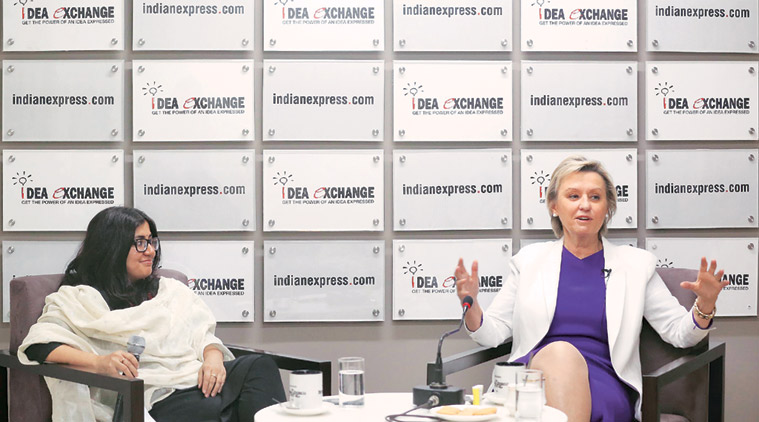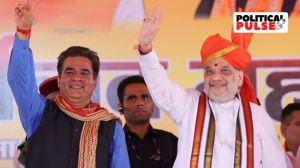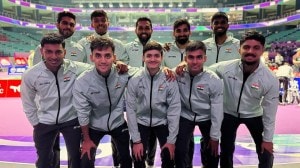- India
- International
White men don’t like her and young people don’t like her. It’s tough being Hillary: Tina Brown
Journalist, editor, author and now the founder and CEO of a live media firm, Tina Brown began her career as the editor-in-chief of Tatler magazine at the age of 25.
 Author and journalist Tina Brown (right) with Deputy Editor Shalini Langer at The Indian Express office. Amit Mehra
Author and journalist Tina Brown (right) with Deputy Editor Shalini Langer at The Indian Express office. Amit Mehra
Shalini Langer: Spotlight won the Oscar for the best film this year. It celebrated the kind of journalism where you put in almost a year’s work into a story. You have often faced criticism for running up expenses while chasing a story that may or may not materialise. At a time when everyone is chasing ‘breaking news’, do you think there is still space for that kind of journalism?
I think it is a tragedy. The digital medium has blown up the economic model to the point that long form and investigative journalism are getting very little space. I think Spotlight did well not only because it is a good film, but because there is a hunger, people want it (such content). At the same time, someone is going to have to pay for it, and people don’t seem to want to pay for it.
There is some very good investigative journalism happening in America. There is ProPublica and there are websites such as The Marshall Project, which are doing great stuff, but it is a needle in a haystack. You can’t really find it, it appears, it’s excellent, it might get picked up, but it doesn’t have that institutional pressure, that of having come from a source that everybody is reading. It is not just about investigative journalism and paying for such content. It is also about getting attention for it (an investigative story) once it is published. So, there is also the problem of not having people to read it. I am a little pessimistic about the situation.
Shalini Langer: So how do you get somebody to read these kind of stories? Does it also require support from other media outlets?
I have always thought editing is about seduction. I think everything is the enemy of the piece that I want someone to read. When I took over The New Yorker (1992-98), people would say, ‘I loved it. I have it in the lock basket next to my bed’. I have always thought that’s a terrible sign. It suggests that people meant to read it have not read it.

It’s very important for newspapers to do things. It is an important battle. You are already battling the iPhone. Having moved now into live media, I have exactly the same philosophy. We do live media summits — Women in the World Summit, American Justice Summit — and we programme it absolutely like I did a magazine, which is all about getting people hooked on to something that they will be interested in. That is how they would end up watching things that they would have never watched.
We keep it very fast paced. We use very intense video and keep them (the audience) captive in their seats because of the mixed pace and the selling that we do for each of the discussions, as if it was an article, had headlines, photographs etc.
We work constantly on the seduction point and I think unless you do that, you are doomed, you just cannot get attention. You have to give a lot of attention to everything that you are publishing — headlines, blurbs, content.
Watch video: Idea Exchange with Tina Brown
Maneesh Chhibber: At a time when everyone carrying a smart phone is a virtual editor, what do you think are the problems confronting an actual editor?
I think what is very difficult, and I’m very emphatic to reporters about it, is the endless pressure to post before you are ready. When the story is half-baked and you haven’t got it… It is a very difficult thing. Online, it is very difficult to get depth, you have to be very fast. But on the other hand, these online platforms have reach, and when it works and goes viral, it is so exhilarating because you can make a huge impact.
I’m sure you read about the Rolling Stone (case). When Rolling Stone published this huge, hot and heavy piece about rape (an article published in the November 19, 2014, issue of Rolling Stone, which described an alleged group sexual assault at the University of Virginia), the source, it turned out, had totally made up the whole thing. Basic things had to be checked in the case. The reporter did not even check if there was a fraternity party that night, in that place (mentioned by the source). There were so many awful red herrings. They did not do the basic things and that can destroy a magazine. Rolling Stone was really hurt by that and it took away a huge chunk of their credibility.
Maneesh Chhibber: In recent times, both in India and the US, the editor is facing a big challenge, that of politicians not speaking with you unless you are on their side. How do you deal with that?
It is a very difficult problem and television is most vulnerable to it. If they don’t have a guest, they have an empty chair. We have this problem constantly. Certain people refuse to turn up, don’t want to participate if they don’t have the questions they want. Then there is no show. The journalist does not get any marks for that in his own company because he becomes the guy who failed to get the guest. Actually Fox’s (news channel) moderation of the debates, for all the criticism that they get, is the best. Megyn Kelly, this very good new anchor, has been asking some very, very tough questions.
In print, you have better leverage because at least you can go to multiple sources and get stories. You can still have a story, create a profile of someone if he doesn’t cooperate. But in television, it is impossible.
Vandita Mishra: What are the challenges that someone like Donald Trump poses for the editor in America today?
I don’t think editors see it as a challenge. He gets glorious free media, he has spent the least on advertising because he gets so much coverage. Television just loves him because of the ratings. He doesn’t bother much with print because for him, it is a waste of time. There is a bit of more soul-searching now about it because there is a sudden realisation that this guy is winning state after state and could end up with a nomination, and I think the ‘Stop Trump’ movement is gaining momentum.
The challenges are to keep on fact-checking him, and finding new ways to shock people. The Daily Beast did an excellent piece (July 2015) on how the Trump Tower was built by a huge bunch of Polish immigrant workers. I had thought then this was great, the piece was terrific and it would ruin Trump. But surprisingly, it did not get any attention. I didn’t understand why.
Shailaja Bajpai: Would you say that the media actually has the power to make or break someone like Donald Trump?
He has gotten this far because he tells so many lies. The interesting thing is that a straight politician would be brought down by so many lies. I think Trump will just be brought down with a self-inflicted wound that even he can’t walk away from.
Shailaja Bajpai: If indeed it is Hillary Clinton versus Donald Trump in the final race to the White House, what in your opinion will be the outcome?
Actually it looks good for Hillary Clinton (candidate for the Democratic nomination for US President), because Trump is only popular with some crazy primary voters. If you look at Republicans overall, he has really high negatives. The Republicans are in a state of hysteria because of what they have done to themselves. The truth is, it is all their fault. They are finally understanding that they committed suicide. So it looks good for Hillary in that sense. But she has very high negatives too. She may even get some moderate Republicans (to vote for her). The danger could only be if the Bernie Sanders (candidate for the Democratic nomination for US President) supporters decide to sit this one out as a protest.
Hillary is doing well at the moment. She is keeping steady. She has had some reverses, the white men now don’t like her, and young people don’t like her. It is tough being Hillary. She deserves (the nomination). When you see what she is up against, it is quite frightening.
Shalini Langer: There have been comparisons made between Donald Trump and Prime Minister Narendra Modi, on how they prefer social media for interactions, instead of traditional interviews. Do you see any parallels?
Aside from the mastery of Twitter — though Trump’s tweets are totally misspelt — I don’t really see any parallels, because I think Modi is fiercely intelligent, he reads everything, he is a huge devourer of information. That is not true of Donald Trump. The only thing he really watches is this morning talk show, Morning Joe, which is slightly fashionable because 3,000 people watch it. The only knowledge of foreign affairs that he has is from 10 minutes on the treadmill when he looks at a little bit of Morning Joe. So when he was asked who would he make his secretary of state, he said, ‘Richard Haass (American diplomat ) would be great, that very smart guy on Morning Joe and that guy Waleed’. I figured out he must have meant Fareed Zakaria, host of CNN’s Fareed Zakaria GPS. Which is the other thing that he watches for two minutes. So I texted Richard Haass saying, ‘You have very serious competition from Waleed’.
Shailaja Bajpai: You have spent a considerable part of your career in magazines. Do you think magazine journalism is in danger, and what did it bring to the table that we have lost?
It is very difficult for magazines. I still think most magazines have a role. The New Yorker is one that is still alive. Atlanta has done a very good job. They consistently get pieces that enter the conversation and are sustained in debates. As a magazine junkie all my life and a creator of them, unfortunately I very rarely buy them. It is all on my phone. I hear about an article and I read it online. It is a shame because I miss the emotion in print and one of the things that I find frustrating in online journalism sometimes is that it has to be in a format. But in magazines, you can have emotion and drama, in newspapers too. You have the big splash; it is like today it (this news) is important, so it looks different from tomorrow, and so there is a huge picture (on the page). But tomorrow there isn’t a huge picture, there is a spread or there isn’t. So you can respond and bring the emotion and seduction of the feeling to the layout, which you cannot do online. I used to find it so frustrating to have to be stuck with the same format. You can’t suddenly blow a photograph up. That is frustrating.
The Indian newspaper culture is still very vibrant. I feel that there is a lot of pressure to only be digital (in America).
Monojit Majumdar: Do you think you would have been the journalist that you are if you had not edited magazines like The New Yorker?
Well, I think an editor is always changed by the title that he edits. I mean, if you take on a tabloid title, you will be marinated in that and it will change you even if you weren’t like that in the beginning. I left Vanity Fair (1984–1992) because I wanted to up my game more and taking on The New Yorker was a different kind of challenge. Then to go to digital journalism was another kind of sharpening of skills. It is very important to keep on sharpening and putting yourself out of your comfort zone to a new place where you are being challenged in different ways. I grew by doing this.
Shalini Langer: Do you think Michelle Obama would make a good presidential candidate a few years down the line?
I think she (Michelle) is a powerful communicator. I can’t see her having a political career. I think she might develop… They (Michelle and Barack Obama) are both young and I feel they both haven’t had a chance to do something that they really wanted to do, to sort of work with underprivileged African American youths. She (Michelle) has hated the White House so much. Being the first lady is a pretty tough job. You got to be perfect.
Apurva: Recently we had the JNU controversy, where a couple of students were charged with sedition. This is spreading to a couple of other universities too in India. Are there limits to speech and action in American universities?
We have completely different problems. For instance, having to rename everything because it might offend or trigger certain emotional traumatic experiences. If you have a name of someone who was connected to slavery or connected to misogyny… All this is really going to make history a very tough sell because what can you call yourselves anymore that is pure and free of any kind of stench or bad feeling? In a way that is just the kind of political correctness on a binge, and it will self-correct, which is a great thing about America. So it is a very good thing that in the US, you can say pretty much what you like. The digital sound byte though has gotten people very, very scared because it just bites you ferociously and you can have your career ended by the wrong sound byte.
Sedition just seems to be a complete mistake as an idea. I am amazed that it can’t be changed, the law of sedition.
Ayushman Basu: At the Women in the World Summit last November, you said that the gender discourse in India is very exciting.
I think that there has always been tremendous violence against women in India, but the important thing is that people are talking about it, acting on it, willing to know about it and covering it. That to me is an exciting development because that wasn’t necessarily true in India’s past. So women in India are definitely surging ahead in many areas, are super- educated and many of them are going into these jobs that they could never do before. But there is an enormous gap between what is happening in rural India and what is happening in the cities, and that is a massive challenge that needs to be addressed.
Apurva: When this JNU incident happened, television did play a large role in ramping up sentiments across the country. They were playing a lot of videos that were apparently doctored. With easy access to cellphones, anyone can put out a video. How do you work your way around such things?
I believe in hiring very credible journalists who ask questions. I am enormously sceptical and I have a certain built-in instinct that you develop that this doesn’t feel right. But really, you need to have extremely credible journalists. Which is why you cannot afford children walking around saying that this is going viral. You need some wise heads. So if you are going to say this, be sure it is right. I mean, who supplied this? You really need to ask where is it (the story) is coming from. I think that is about training.
Why TINA BROWN
Journalist, editor, author and now the founder and CEO of a live media firm, Tina Brown began her career as the editor-in-chief of Tatler magazine at the age of 25. Between 1984 and 2001, she was editor-in-chief of Vanity Fair, The New Yorker and Talk, and later Newsweek in 2011. She also authored the 2007 biography of the Princess of Wales, The
Diana Chronicles. In November last year, her Tina Brown Live Media organised the Women in the World Summit in New Delhi
(Transcribed by Pallavi Chattopadhyay & Vandana Kalra)
Apr 26: Latest News
- 01
- 02
- 03
- 04
- 05







































